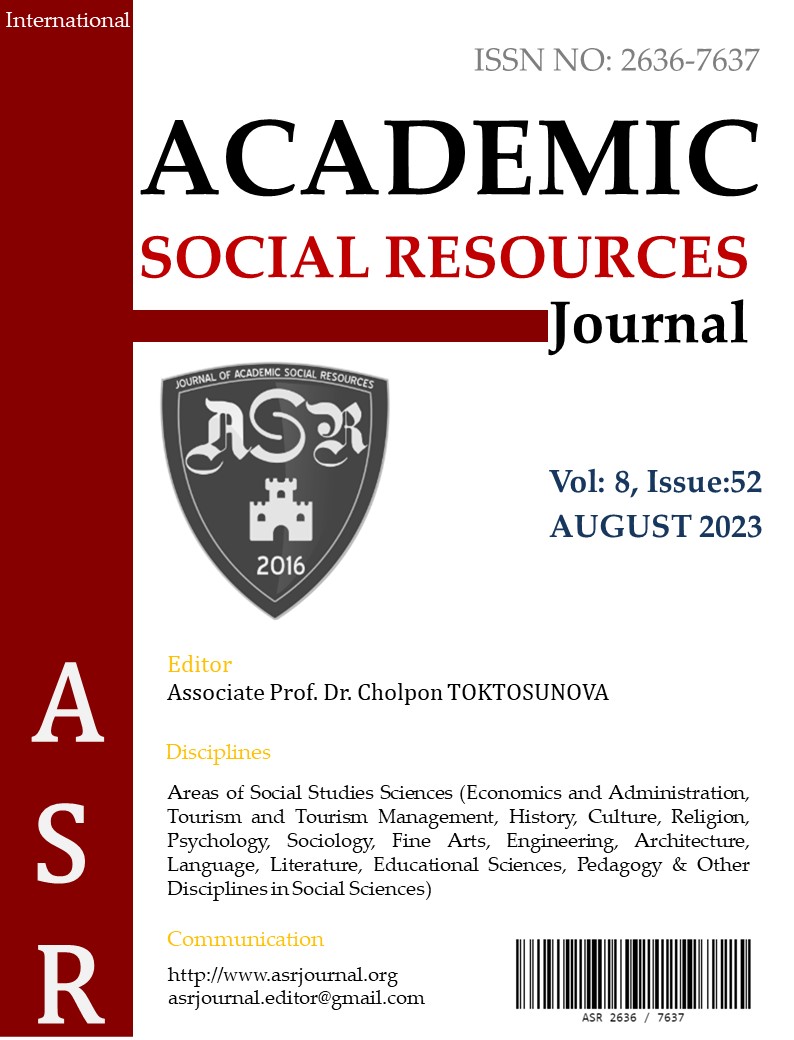Author :
Abstract
Akıl ve zekâ oyunları öğrenme ortamlarının niteliğini artırıcı bir özelliğe sahiptir. Akıl ve zekâ oyunlarının bu özelliğinin eğitim ortamlarında kullanılması matematik eğitiminde de araştırmaların yönünü bu noktaya çevirmiştir. Buradan hareketle bu araştırmanın amacı mevcut uygulamadaki Matematik Dersi Öğretim Programı’nda (MEB, 2018) bulunan etkinliklerin yanı sıra akıl ve zekâ oyunları etkinliklerinin de kullanılmasıyla yapılan öğretim etkinliklerinin 7. sınıf öğrencilerinin matematik başarısına etkisini incelemektir. Araştırma grubunu, 2019-2020 eğitim öğretim yılında Marmara Bölgesi’nin bir ilinin merkez ilçesinde Millî Eğitim Bakanlığı’na bağlı uygulama izni verilen resmi bir devlet ortaokulunda öğrenim gören on dört 7. sınıf öğrencisi oluşturmaktadır. Araştırmada deney ve kontrol grupları bulunmaktadır. 7 öğrenci deney grubunda 7 öğrenci de kontrol grubunda olmak üzere araştırmada toplam 14 öğrenci bulunmaktadır. Araştırmada ön test – son test kontrol gruplu yarı deneysel model benimsenmiştir. Araştırmada veri toplama aracı olarak Matematik Başarı Testi kullanılmıştır. Bu test deney ve kontrol grubunun her ikisine de ön test ve son test olarak uygulamanın başında ve sonunda uygulanmıştır. Deney grubundaki öğrencilerle Matematik Dersi Öğretim Programı’nda önerilen etkinliklere göre dersler işlenmiş ve bu derslere ek olarak her hafta belirlenen gün ve saatlerde akıl ve zekâ oyunları öğretimi ile uygulama yapılmıştır. Kontrol grubundaki öğrencilerle ise sadece Matematik Dersi Öğretim Programı’nda önerilen etkinliklere göre dersler işlenmiştir. Öğrencilerin matematik başarısının uygulanan yönteme göre farklılık gösterip göstermediği Mann Whitney U-testi ve Wilcoxon işaretli sıra sayıları testi ile çözümlenmiştir. Bu araştırmada yapılan analizler sonucunda akıl ve zekâ oyunları kullanılarak yapılan öğretim etkinliklerinin ortaokul öğrencilerinin matematik başarılarını artırdığı görülmüştür. Yarı deneysel modelle yürütülen bu araştırmada deney grubu öğrencilerinin matematik başarılarının kontrol grubu öğrencilerinin matematik başarılarına göre daha yüksek olduğu dolayısıyla deney grubu öğrencilerinin matematik başarılarının artırılmasında akıl ve zekâ oyunlarının yararlı olduğu sonucu ortaya çıkmıştır. Bu araştırmaya dayalı olarak örneklem sayısının artırılarak tekrarlanması ve sonuçların karşılaştırılması önerilebilir. İkinci olarak farklı sınıf seviyelerinde bulunan öğrencilere akıl ve zekâ oyunları eğitimleri verilerek sonuçların değerlendirilmesi ve karşılaştırılması önerilebilir.
Keywords
Abstract
Mind and intelligence games have a feature that increases the quality of learning environments. The use of this feature of mind and intelligence games in educational environments has also turned the direction of research in mathematics education to this point. From this point of view, the aim of this research is to examine the effects of teaching activities using mind and intelligence games activities in addition to the activities in the Mathematics Lesson Curriculum (MoNE, 2018) on the mathematics achievement of 7th grade students. The research group consists of fourteen 7th grade students studying in an official state secondary school, which was given permission to practice under the Ministry of National Education in the central district of a province of the Marmara Region in the 2019-2020 academic year. There are experimental and control groups in the research. There are a total of 14 students in the research, 7 students in the experimental group and 7 students in the control group. In the research, a quasi-experimental model with pretest-posttest control group was adopted. Mathematics Achievement Test was used as a data collection tool in the research. In the research, Mathematics Achievement Test was used as a data collection tool to measure students' mathematics achievement. This test was applied to both the experimental and control groups at the beginning and end of the application as a pre-test and post-test. With the students in the experimental group, lessons were taught according to the activities recommended in the Mathematics Lesson Curriculum, and in addition to these lessons, mind and intelligence games were taught at the specified days and times every week. With the students in the control group, only lessons were taught according to the activities recommended in the Mathematics Lesson Curriculum. The Mann Whitney U-test and Wilcoxon signed ordinal number test were used to determine whether students' mathematics achievement differed according to the applied method. As a result of the analyzes made in this research, it was seen that teaching activities using mind and intelligence games increased the mathematics achievement of secondary school students. In this study, which was carried out with a quasi-experimental model, it was concluded that the mathematics achievement of the experimental group students was higher than the mathematics achievement of the control group students, therefore, mind and intelligence games were beneficial in increasing the mathematics achievement of the experimental group students. Based on this research, it can be recommended to increase the number of samples and repeat them and compare the results. Secondly, it can be suggested to evaluate and compare the results by giving mind and intelligence games training to students at different grade levels.





